originally posted at https://canmom.tumblr.com/post/163254...
Here’s another motion graphic from @fates0end, summarising the major themes of episode 2 (thanks!):
I find it interesting that in the original art, Kanon looks even more femme. And George is noticeably skinnier, though to some extent everyone is. [Correction: this is fanart, not the original art!]
So. We’ve witnessed two sets of horrible murders. Magic may or not be real, but denying magic is real is meta!Battler’s key to defeating Beatrice in this strange game that they’re playing.
This time around, Battler has the open support of Bernkastel, but Beatrice is now supported by the newly introduced Lambdadelta. Things are probably going to be different. At least, I hope they’re going to be a bit different.
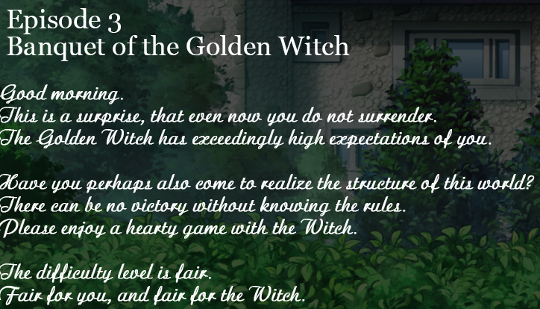
In a more readable font, this says:
Episode 3: Banquet of the Golden Witch
Good morning.
This is a surprise, that even now you do not surrender. The Golden Witch has exceedingly high expectations of you.
Have you perhaps also come to realise the structure of this world? There can be no victory without knowing the rules. Please enjoy a hearty game with the Witch.
The difficulty level is fair. Fair for you, and fair for the Witch.
‘Fair’ seems to be a step down from the previous episode’s ‘first-rate’ difficulty.
What is the ‘structure of this world’? What are the ‘rules’?
We know that, in each instance of the ‘game’, we are presented with a universe, in which a series of murders take place on Rokkenjima featuring the same characters. We are presented a narrative account of what takes place. It’s not clear if any of the known characters control the narrative POV, but if one does, it is surely Beatrice.
It’s not clear if the events within the narrative take place of their own accord, or if Beatrice is manipulating events, most likely by controlling her avatar in the world. That is, does Beatrice ‘select’ a world/seed initial conditions, or does she actively manipulate the plot?
The narrative has presented us with obvious instances of magic, but our (or Battler’s) task is to deny that within the narrative, there is a magical witch called Beatrice. Therefore we have to say the narrator is unreliable at times to have any chance at all. That said, while some scenes definitely include magic and some definitely don’t, the characters in non-magical scenes seem to remember the magic taking place in the few instances they survive it, so there’s not a clear line.
It’s not clear if meta!Battler sees the same version of events that we do. He seems to only respond to things narrative!Battler is present for, so perhaps he sees only those things?
It’s not clear if meta!Battler has some capacity to affect narrative!Battler’s actions. They’re distinct, but they do seem to follow very similar emotional arcs.
Let’s see what we can learn.
We begin in a building we’ve never seen before, which might be a church, or at least a stately home with a chapel.
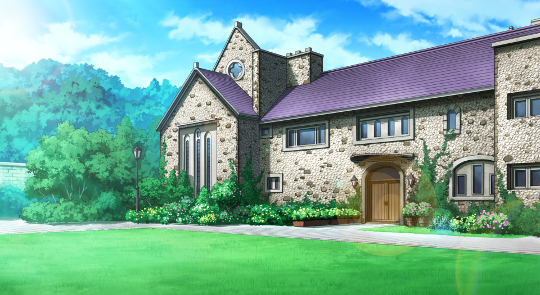
The narration begins by talking about a posh vase.
Someone - a child - accidentally breaks it from a first-person pov. They refer to Grandfather owning the vase and fear being harshly scolded. At that point, Beatrice’s butterflies show up. The child seems to be familiar with Beatrice.
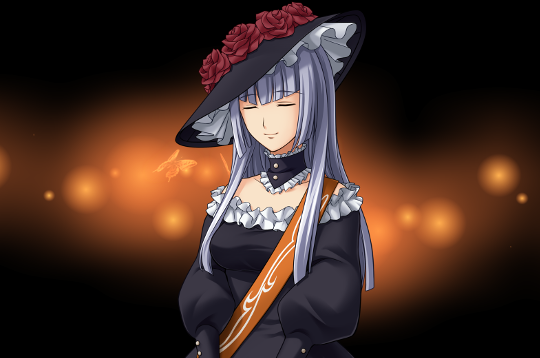
This instance of Beatrice has a completely different look. Also, different voice acting. She greets the ‘princess’ whose POV we have.
Although the visuals are very different, some familiar aspects of Rokkenjima still seem to apply. There is a grandfather - ‘master’ - prone to rages and harsh punishments.
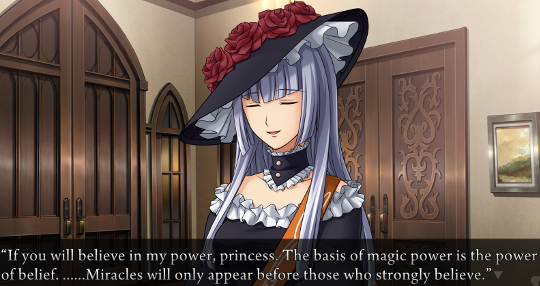
New-Beatrice promises to prevent the ‘princess’ getting punished, as long as she believes in the magic.
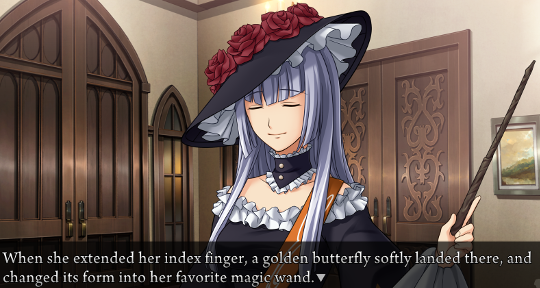
This time, Beatrice has a magic wand. Well, several. And she speaks magic words, framing it as a request to the vase to show her the form it once had. The vase is restored.
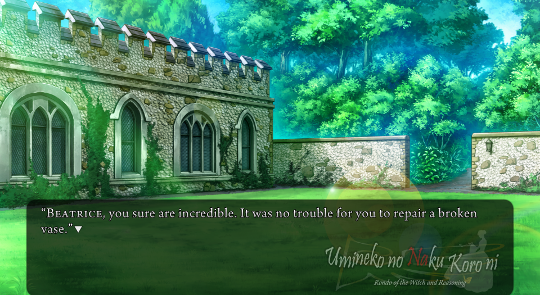
We move to a different part of this strange new house. The top of the wall has small crenellations, like you see in a lot of Victorian buildings that want to pretend to be medieval. ok apparently decorative crenellations are older than that.
European architects persistently used battlements as a purely decorative feature throughout the Decorated and Perpendicular periods of Gothic architecture. They not only occur on parapets but on the transoms of windows and on the tie-beams of roofs and on screens, and even on Tudor chimney-pots. A further decorative treatment appears in the elaborate paneling of the merlons and that portion of the parapet walls rising above the cornice, by the introduction of quatrefoils and other conventional forms filled with foliage and shield.
This has been Architecture Facts.
The princess tells Beatrice how incredible her magic was. Beatrice clarifies that repairing broken objects is very difficult magic, and this is only temporarily making it ‘remember’ the unbroken form. She says she has yet to reach that higher level of magic.
The most obvious interpretation here is that we are dealing with a much younger Beatrice, before she was trapped on Rokkenjima by Kinzo. She seems a lot less capricious and cruel here too.
At that point, they hear an unnamed servant scream as a ‘black cat’ enters the house and breaks the vase. Essentially the vase was ‘fated’ to break, and Beatrice only delayed this fate, meaning someone other than the ‘princess’ broke it.
Beatrice gives a short lecture on the capabilities of magic: it’s much easier to break and kill than to repair.
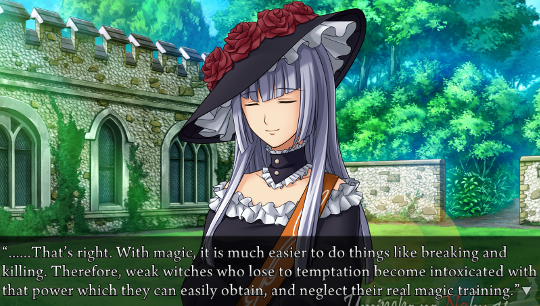
So witches often fall to the dark side. But ‘real magic’ is repairing, reviving and healing. Beatrice contrasts her abilities to her powerful ‘master’, who she believes could permanently restore the vase. She says witches on the level of her master have ‘endless’ magical power, and are therefore called ‘endless witches’ out of respect. Which is the epithet which the more familiar Beatrice had…
I checked the characters screen for information on this new Beatrice, and found that instead there’s already full details of the cast, with both a human side (all unchanged) and a witch side (previously we only had access to the witch side after completing an episode). This time we have detailed biographies of the ‘Seven Sisters of Purgatory’ (now Sisters, not Stakes), including descriptions of their personalities and… how much they want a boyfriend? It’s weirdly more like a school anime than anything, except on one of the Sisters there’s an implication of creepily sexualised cannibalism so uh. That’s a thing. [Note from the future: It sure is a thing! 😋]
Beatrice says an Endless Witch is released from all the sadness of loss.
We can compare this to the Beatrice we know. She’s using her ‘endless’ powers of restoration not to heal, but to allow her to torture and kill over and over again.
The princess declares her wish to become a disciple of Beatrice, despite the difficult path.
Ohh, here’s a thought? What if the ‘princess’ - who we still have yet to see - is the future Beatrice, taking the name of her former master?
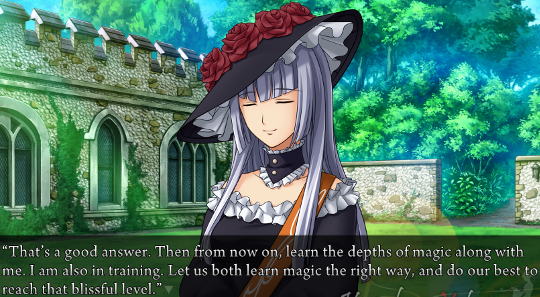
Old Beatrice agrees. And we fade to Purgatorio.
Beatrice reveals what we just saw was a dream, and ‘that face’ brings her back. She says ‘endless witch’ - which she once regarded as the highest achievement - is now ‘just one of her titles’, even a name.
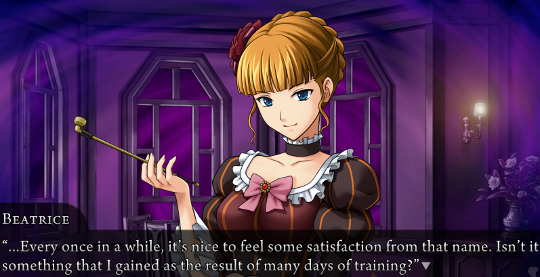
But then we get first-person narration from Beatrice. She says, contra her master, it’s not eternal bliss to be ‘endless’, but eternal boredom, eternal torture. Witches who have achieved the title ‘Lady’, she says, find boredom as the ‘eternal poison’, torturing them forever.
Beatrice says she wishes she could talk to her master again, about whether they’ve really achieved happiness. She refers to ‘training together’, so I’m pretty sure the familiar Beatrice is the ‘princess’ character above. Apparently her master said believing one had completed one’s training and reached the ‘eternal’ level is a sign of immaturity.
An ahaha.wav plays. Beatrice wonders if her ‘furniture’ has broken their ‘toy’ again. No doubt the ‘toy’ is some poor human.
Beezlebub shows up, along with Mammon and Leviathan, who are new to us I think. They’re upset because they’ve murdered the ‘man’ they were playing with. Satan shows up and scolds them for always ‘devouring him like starving dogs’. But then Belphegor tells off Satan for not knowing restraint either, and ‘breaking him the most’. Lucifer appears to apologise for her ‘cretinous’ younger sisters, and finally Asmodeus whose turn to ‘play’ is next.
What a pleasant bunch.
Beatrice tells them all to shut up and they run away in fear. She tells the bloody mess of whoever they killed (I’m guessing it’s Battler, because who else) to remember his form.
It is indeed Battler. Apparently being torn apart by the Seven Sisters is just his life now.
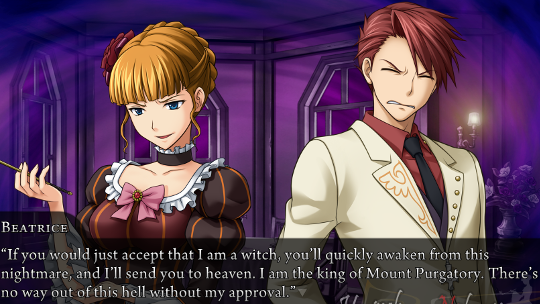
Beatrice refers to herself as the King of Mount Purgatory. So this is literally Purgatory, in the Christian tradition? [correction: apparently this is an allusion to the character Beatrice in the Divine Comedy.]
Battler’s first words after he recovers are to drop his catchphrase.
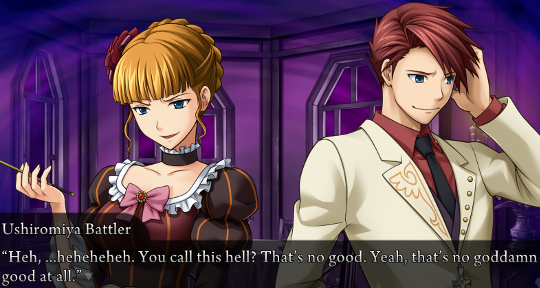
Apparently the reason he doesn’t mind is because he’s sexualising the Seven Sisters. Is this actually how straight people think? [Note from the future: it’s crazy to think: there was a time when I couldn’t appreciate ero-guro. Fortunately, such times are behind us. Battler is, we may recall, fictional.]
So uh… they’re not just torturing him and murdering him. They’re also trying to get him to explain the locked rooms in the previous game?
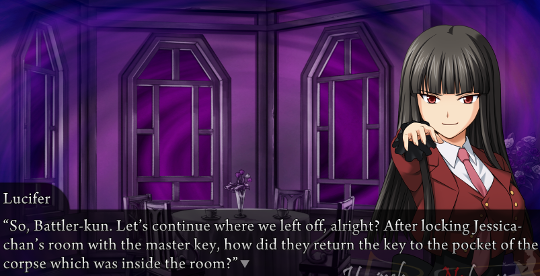
So we’re back to this. Battler suggests a fishing line could be used to place the key back on Jessica’s corpse. The seven sisters turn out to have red text powers too. Belphegor declares Of all the doors that exist on Rokkenjima, none has a crack through which a key can slip.
Whenever Battler ventures an incorrect theory, they hit him a whole bunch of times. Battler still stubbornly refuses to believe in witches and magic. So he dies again.
Beatrice suggests murdering someone over and over is the ‘eternal bliss’ her master once described. Yeah, sure, that’s definitely it.
Beatrice announces it’s time for the next game to begin. The PS3 intro plays again.
Comments
Branwen
Regarding future Bryn’s comments: I find these meta scenes (this one and the one with him interrupting the previous tea party) specifically with Battler being uncomfortably sexual absolutely fascinating in the way they contrast Battler’s dual positions as an undeniably powerless victim and a young, rich man who holds tremendous implicit social power over the women in his life.
Like he is powerless to the point that escape even through death is unimaginable, objectified in a sense far more literal than its often used. But rather than this leading him to empathize with, frankly literally any of the women or servants in his family and the power dynamics they’ve spent their lives subjected to, he doubles down on his socially implicit male role as the objectifier, as the person who gets to feel powerful, in control, perhaps even funny and charming! Certain I knew plenty of teenagers back in the day, especially boys, who were undeniably popular and considered funny for making uncomfortable transgressive “jokes” about women, children, poc, etc. And I think its probably true that victims by and large don’t become better people for suffering. Personal growth is hard, and its only made harder by feeling vulnerable and afraid. Most people just lash out and double down in that situation, Battler included.
That’s also fwiw a framing I really like for Battler’s behavior around his cousins. He hasn’t seen them in a third of his life! Its so easy to imagine him feeling insecure, out of place, vulnerable from his fear of planes and boats, unsure of his position in the social hierarchy of a deeply hierarchal family. So what does he do? He acts up, he makes himself the center of attention. Maybe’s done that in class a dozen times, acting the rebellious class clown who made his peers laugh with inappropriate jokes, the kid who was a little too rich and not quite disruptive enough for the teachers to ever do more than tell him off. He hits his baby cousin when she says things he thinks are wrong, because he’s the adult now and that’s what her mom does, isn’t it? He needs to show he’s mature now, after six years. He doesn’t hit her hard, he doesn’t want to hurt her, its just a little reprimand, he’s just trying to teach her better behavior so she doesn’t get bullied. He doesn’t even realize that his actions are just as potentially hurtful and damaging to Maria as Rosa’s were when he was the only one to rightfully call her out in game one.
It’s such a compelling characterization to me bcuz not only does it make him a really nuanced protagonist, someone who cares deeply about his family despite their flaws, who feels strongly enough even as a child to renounce his family name and cut off his own father over a perceived abandonment of his dead mother! But it also paints a really believable picture of the way the shitty little things about patriarchy and abusive power dynamics continue to propagate. The microaggressions, the ways smart, empathetic men who it seems like should know better will often double down and get defensive when their behavior is challenged, the way people who explicitly reject the power dynamics of their parents can still recreate them in subtler ways, an example of how victims can and do become abusers in their own rights even without realizing it.
Not to mention that like. It’s honestly really relatable! I’ve personally felt the urge many times to lash out with words when I feel powerless to try and assert that I have some say in things still. I used to make nasty, self-effacing jokes when I felt insecure or out of place, for reasons that feel much the same as I imagine Battler’s to be, and I have friends who still haven’t broken that habit. I still struggle with feeling like an “adult” around my parents sometimes, despite the fact that I first moved out over a decade ago, in no small part due to financial dynamics and having had a really rocky relationship with them growing up. I’m sure pretty much anyone with friends around my age (especially trans friends!) has heard similar things.
I think it can be tremendously effective writing for exactly that reason. If (or perhaps when!) one can look past the shock value and the discomfort with Battler’s behavior to ask “Why might someone act like that?”, they’re placed in the perfect position to recognize that the small (but difficult!) step they’ve taken towards kindness and greater cognitive empathy is exactly the same skill that Battler is struggling to master. And its a skill that can do so, so much good in the world.
canmom (742623938c762ec774109eebb1c42915)
This is such a fantastic comment! Really good analysis of what’s going on with Battler, and with Umineko in general—it’s so much a story about learning to understand the Other, the ‘why would someone do that’.
With the benefit of a few more years’ hindsight, I feel like I can understand both the version of me who wrote this part of the liveblog originally, and the version who wrote the ‘notes from the future’, with sympathy to both. It’s kind of funny, really. Both ‘Bryns’ were trying very hard to play up to some ideal, not unlike what you say about Battler. When I edited in all these notes I was feeling this strange sense of shame about what I saw as my overly moralistic younger self, but now it’s evident how much at that point I was also trying to perform like ‘I’m cool now, I’m into edgy guro stuff’ to some other imagined judgemental viewer. Kind of cute in a way.